In the age of many new business acronyms being made every year, you might be lost when finding out about RPA, IPA, BPA and much more. Test automation, industrial automation, and robotics… What do the terms all mean!? Are automation and robotics a similar thing?
Many individuals think about whether automated systems are appropriate for them. Businessmen are asking “Would it be a superior plan for them to put funds into robotic process automation?” and “Would it be an excellent plan for them to put funds into IT process automation?” In any case, what’s the difference between the two? Is process automation the similar thing as robotics technology?

Perhaps you heard that ‘automation solutions’ can deliver stunning advantages to the organizations which choose to execute them, however, chances are — you don’t know where to begin. In case you’re coming from a non-technical foundation, you may be even thinking about whether apply automation and robotics are similar things.
Automation is an extension of RPA technology and can be named as the next period of the digital transformation. The present digital transformation looks to disturb the current procedures and upgrade them with programmable rationale. While it is simple to distinguish a repetitive procedure or task, it is similarly hard to program such a code, to the point that can make a machine do this movement on a permanent basis.
As innovation has enhanced after some time, robotics and automation have made advances into associations where tasks may have been impossible, dangerous or just plain mundane for people.
You can think about utilizing automation if there are a couple of tasks that are repetitive. In any case, if the assignments are physical, you can go for robotic automation. So, what’s the difference between automation and robotics?
The process automation technology is a general term for work performed by IT and machines.
The robotic process is an advanced type of automation that is self-sufficient or semi-self-governing.
Does My Company Need Automation or Robotics?
First of all, if you are working in a high development organization, you are most likely thinking about whether automation and robotics engineering could be ideal for your business and if indeed, how might it be connected. The quick answer is: it truly relies upon your present business structure and its needs.
With the end goal to set up if it’s the best thing for you to think about the accompanying:
- Are any assignments in your business at present done by human employees and are repetitive, pursue similar procedure logic and are exhausting?
- It is safe to say that they are physical assignments or virtual tasks?
- Are any tasks in your business a bottleneck to profitability?
In the case that you can consider even a couple of tasks which are tedious, repetitive or cause a bottleneck, they might be a good candidate for automation. If they are virtual assignments, a type of software automation is considered. If they are physical tasks, industrial automation or RPA (robotic process automation) could be the appropriate response.
There are a couple of crossovers between the two where robots can be utilized to automate different physical tasks. But, one should remember that automation isn’t related to physical robots and robotic process automation technology has nothing to do with automation
Let’s have a close look at different terminologies:

Automation
With the expanding demand for automation, adaptive automation, business process automation, and robotic process automation software are everywhere.
Software Automation
This uses software to do the assignment done by people utilizing PC programs. For instance, GUI tests automation. A few sorts of software automation include:
- Intelligent Process Automation (IPA)
- Business Process Automation (BPA)
- Robotic Process Automation (RPA)
Industrial Automation
Industrial automation comes in the photo when we discuss both robotics and process automation. It includes a control framework and machines to automate assignment inside an industrial procedure.
What Is Robotics?
How about we begin with the fundamentals, Robots are programmable machines which can complete a progression of activities independently, or semi-autonomously. They interface with the physical world by means of sensors and actuators. Since they are reprogrammable, they are more adaptable than single-function machines.
RPA robotics, in this way, alludes to anything linking robots.
Inside industrial automation, robots are utilized as an adaptable method to automate a physical assignment or process. Collective robots are intended to complete the task similarly a human would. More conventional industrial robots tend to complete the task more proficiently than a human would.
Robots That Are Not Automation
To make it somewhat more complicated, a few robots are “self-sufficient” however they are not utilized in automation. For instance, a toy line-following robot can independently pursue a line painted on the ground. Yet, it isn’t automation, since it isn’t playing out a particular assignment. If rather, the line-following robot were transporting solutions around a healthcare, at that point it would order as automation.
To outline, the principal difference among robotics vs automation is that robots are a piece of equipment that can play out an assortment of tasks with programming, while bespoke automation is a term that is utilized for uncommon reason machines or systems that are intended to play out a particular assignment.
Yet, to put it plainly, Robotics is only one of numerous strategies for Automation!
We, at TestOrigen also provide test automation testing services around the world helping our clients saving time and money.
